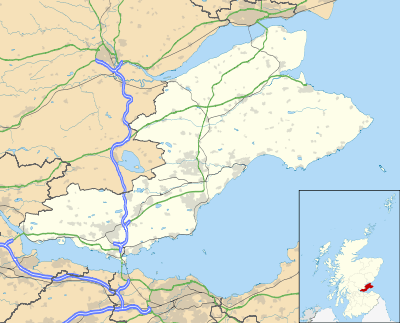Craighall Castle
Craighall Castle is located in Ceres, Fife, Scotland.[1][2] It was built in 1637 by Sir Thomas Hope but there was a tower of previous land owners before 1637. It is now demolished and only some of the castle's walls remain.[3][4]
| Craighall Castle | |
|---|---|
| United Kingdom | |
 Craighall Castle Location in Fife | |
| Coordinates | 56°17′05″N 2°57′30″W |
| Site history | |
| Built | 1637 |
| Built by | Sir Thomas Hope |
| In use | Until 1957 |
| Materials | Rubble |
| Fate | Demolished |
History
The lands were owned by Andrew Kinninmond and his family before selling it to Sir Thomas Hope. Hope built the castle in 1637. In 1954, the old tower was removed after the castle's granary burnt down. The castle was in very poor condition and was demolished in 1957. Some portion of walls still remain.[3]
Architecture
Craighall Castle was built with rubble and stones. The walls are 1 metre to 1.3 metres thick. An old wall which is 10 metres long and 3.5 metres high still remains in the site.[3]
gollark: It would also not be very useful for spying on people, since they would just stop saying things if they got a notification saying "interception agent has been added to the chat" and it wouldn't work retroactively.
gollark: One proposal for backdooring encrypted messaging stuff was to have a way to remotely add extra participants invisibly to an E2Ed conversation. If you have that but without the "invisible" bit, that would work as "encryption with a backdoor, but then make it very obvious that the backdoor has been used" somewhat.
gollark: Not encryption itself, probably.
gollark: They don't seem to want to *ban* end-to-end encryption as much as backdoor the popularly used stuff. Which is still bad. I should finish writing that blog post on it some time this decade.
gollark: It's probably with consent to the extent that *any* social media apps do, i.e. "the long incomprehensible privacy policy says we can".
References
- Martin Coventry (2006). The Castles of Scotland.
- "David Bryce". scottisharchitects.org.
- "Craighall Castle". canmore.org.
- "Ordnance Gazetteer of Scotland : a survey of Scottish topography, statistical, biographical and historical". archive.org.
This article is issued from Wikipedia. The text is licensed under Creative Commons - Attribution - Sharealike. Additional terms may apply for the media files.